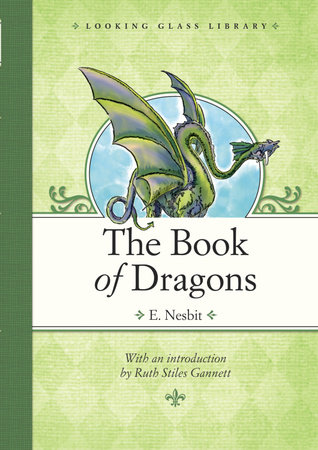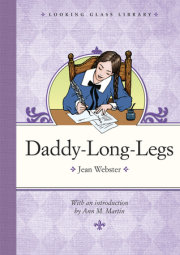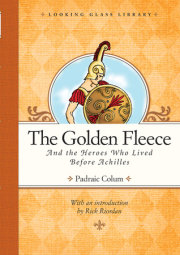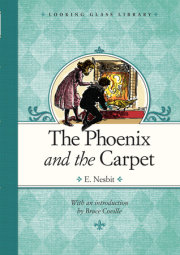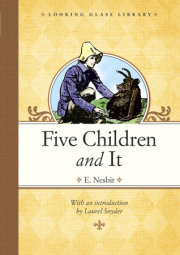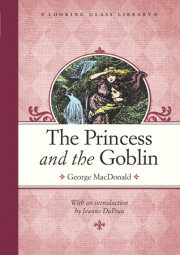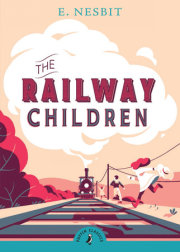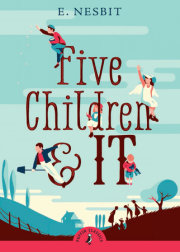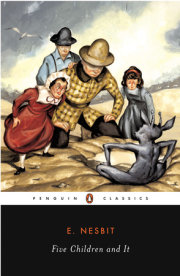1
THE BOOK OF BEASTS
He happened to be building a palace when the news came, and he left all the bricks kicking about the floor for Nurse to clear up--but then the news was rather remarkable news. You see, there was a knock at the front door and voices talking downstairs, and Lionel thought it was the man come to see about the gas which had not been allowed to be lighted since the day when Lionel made a swing by tying his skipping-rope to the gas-bracket.
And then, quite suddenly, Nurse came in, and said, "Master Lionel, dear, they've come to fetch you to go and be King."
Then she made haste to change his smock and to wash his face and hands and brush his hair, and all the time she was doing it Lionel kept wriggling and fidgeting and saying, "Oh, don't, Nurse," and, "I'm sure my ears are quite clean," or, "Never mind my hair, it's all right," and "That'll do."
"You're going on as if you was going to be an eel instead of a King," said Nurse.
The moment Nurse let go for a moment Lionel bolted off without waiting for his clean handkerchief, and in the drawing-room there were two very grave-looking gentlemen in red robes with fur, and gold coronets with velvet sticking up out of the middle like the cream in the very expensive jam tarts.
They bowed low to Lionel, and the gravest one said:
"Sire, your great-great-great-great-great-grandfather, the King of this country, is dead, and now you have got to come and be King."
"Yes, please, sir," said Lionel; "when does it begin?"
"You will be crowned this afternoon," said the grave _gentleman who was not quite so grave-looking as the other.
"Would you like me to bring Nurse, or what time would you like me to be fetched, and hadn't I better put on my velvet suit with the lace collar?" said Lionel, who had often been out to tea.
"Your Nurse will be removed to the palace later. No, never mind about changing your suit; the royal robes will cover all that up."
The grave gentlemen led the way to a coach with eight white horses, which was drawn up in front of the house where Lionel lived. It was No. 7, on the left-hand side of the street as you go up.
Lionel ran upstairs at the last minute, and he kissed Nurse and said:
"Thank you for washing me. I wish I'd let you do the other ear. No--there's no time now. Give me the hanky. Good-bye, Nurse."
"Good-bye, ducky," said Nurse; "be a good little King now, and say 'please' and 'thank you,' and remember to pass the cake to the little girls, and don't have more than two helpings of anything."
So off went Lionel to be made King. He had never expected to be a King any more than you have, so it was all quite new to him--so new that he had never even thought of it. And as the coach went through the town he had to bite his tongue to be quite sure it was real, because if his tongue was real it showed he wasn't dreaming. Half an hour before he had been building with bricks in the nursery; and now--the streets were all fluttering with flags; every window was crowded with people waving handkerchiefs and scattering flowers; there were scarlet soldiers everywhere along the pavements, and all the bells of all the churches were ringing like mad, and like a great song to the music of their ringing he heard thousands of people shouting, "Long live Lionel! Long live our little King!"
He was a little sorry at first that he had not put on his best clothes, but he soon forgot to think about that. If he had been a girl he would very likely have bothered about it the whole time.
As they went along, the grave gentlemen, who were the Chancellor and the Prime Minister, explained the things which Lionel did not understand.
"I thought we were a republic," said Lionel. "I'm sure there hasn't been a King for some time."
"Sire, your great-great-great-great-great-grandfather's death happened when my grandfather was a little boy," said the Prime Minister, "and since then your loyal people have been saving up to buy you a crown--so much a week, you know, according to people's means--sixpence a week from those who have first-rate pocket-money, down to a halfpenny a week from those who haven't so much. You know it's the rule that the crown must be paid for by the people."
"But hadn't my great-great-however-much-it-is-grand-father a crown?"
"Yes, but he sent it to be tinned over, for fear of vanity, and he had had all the jewels taken out, and sold them to buy books. He was a strange man; a very good King he was, but he had his faults--he was fond of books. Almost with his latest breath he sent the crown to be tinned--and he never lived to pay the tinsmith's bill."
Here the Prime Minister wiped away a tear, and just then the carriage stopped and Lionel was taken out of the carriage to be crowned. Being crowned is much more tiring work than you would suppose, and by the time it was over, and Lionel had worn the royal robes for an hour or two and had had his hand kissed by everybody whose business it was to do it, he was quite worn out, and was very glad to get into the palace nursery.
Nurse was there, and tea was ready: seedy cake and plummy cake, and jam and hot buttered toast, and the prettiest china with red and gold and blue flowers on it, and real tea, and as many cups of it as you liked. After tea Lionel said:
"I think I should like a book. Will you get me one, Nurse?"
"Bless the child," said Nurse, "you don't suppose you've lost the use of your legs with just being a King? Run along, do, and get your books yourself."
So Lionel went down into the library. The Prime Minister and the Chancellor were there, and when Lionel came in they bowed very low, and were beginning to ask Lionel most politely what on earth he was coming bothering for now--when Lionel cried out:
"Oh, what a worldful of books! Are they yours?"
"They are yours, Your Majesty," answered the Chancellor. "They were the property of the late King, your great-great--"
"Yes, I know," Lionel interrupted. "Well, I shall read them all. I love to read. I am so glad I learned to read."
"If I might venture to advise Your Majesty," said the Prime Minister, "I should not read these books. Your great--"
"Yes?" said Lionel, quickly.
"He was a very good King--oh, yes, really a very superior King in his way, but he was a little--well, strange."
"Mad?" asked Lionel, cheerfully.
"No, no"--both the gentlemen were sincerely shocked. "Not mad; but if I may express it so, he was--er--too clever by half. And I should not like a little King of mine to have anything to do with his books."
Lionel looked puzzled.
"The fact is," the Chancellor went on, twisting his red beard in an agitated way, "your great--"
"Go on," said Lionel.
"Was called a wizard."
"But he wasn't?"
"Of course not--a most worthy King was your great--"
"I see."
"But I wouldn't touch his books."
"Just this one," cried Lionel, laying his hands on the cover of a great brown book that lay on the study table. It had gold patterns on the brown leather, and gold clasps with turquoises and rubies in the twists of them, and gold corners, so that the leather should not wear out too quickly.
"I must look at this one," Lionel said, for on the back in big letters he read: "The Book of Beasts."
The Chancellor said, "Don't be a silly little King."
But Lionel had got the gold clasps undone, and he opened the first page, and there was a beautiful butterfly all red, and brown, and yellow, and blue, so beautifully painted that it looked as if it were alive.
"There," said Lionel, "isn't that lovely? Why--"
But as he spoke the beautiful butterfly fluttered its many-colored wings on the yellow old page of the book, and flew up and out of the window.
"Well!" said the Prime Minister, as soon as he could speak for the lump of wonder that had got into his throat and tried to choke him, "that's magic, that is."
But before he had spoken the King had turned the next page, and there was a shining bird complete and beautiful in every blue feather of him. Under him was written, "Blue Bird of Paradise," and while the King gazed enchanted at the charming picture the blue bird fluttered his wings on the yellow page and spread them and flew out of the book.
Then the Prime Minister snatched the book away from the King and shut it up on the blank page where the bird had been, and put it on a very high shelf. And the Chancellor gave the King a good shaking, and said:
"You're a naughty, disobedient little King," and was very angry indeed.
"I don't see that I've done any harm," said Lionel. He hated being shaken, as all the boys do; he would much rather have been slapped.
"No harm?" said the Chancellor. "Ah--but what do you know about it? That's the question. How do you know what might have been on the next page--a snake or a worm, or a centipede or a revolutionist, or something like that."
"Well, I'm sorry if I've vexed you," said Lionel. "Come let's kiss and be friends." So he kissed the Prime Minister, and they settled down for a nice quiet game of noughts and crosses, while the Chancellor went to add up his accounts.
But when Lionel was in bed he could not sleep for thinking of the book, and when the full moon was shining with all her might and light he got up and crept down to the library and climbed up and got The Book of Beasts.
He took it outside onto the terrace, where the moonlight was as bright as day, and he opened the book, and saw the empty pages with "Butterfly" and "Blue Bird of Paradise" _underneath, and then he turned the next page. There was some sort of red thing sitting under a palm tree, and under it was written "Dragon." The dragon did not move, and the King shut up the book rather quickly and went back to bed.
But the next day he wanted another look, so he got the book out into the garden, and when he undid the clasps with the rubies and turquoises, the book opened all by itself at the picture with "Dragon" underneath, and the sun shone full on the page. And then, quite suddenly, a great red dragon came out of the book, and spread vast scarlet wings and flew away across the garden to the far hills, and Lionel was left with the empty page before him, for the page was quite empty except for the green palm tree and the yellow desert, and the little streaks of red where the paint brush had gone outside the pencil outline of the red dragon.
And then Lionel felt that he had indeed done it. He had not been King twenty-four hours, and already he had let loose a red dragon to worry his faithful subjects' lives out. And they had been saving up so long to buy him a crown, and everything!
Lionel began to cry.
Then the Chancellor and the Prime Minister and the Nurse all came running to see what was the matter. And when they saw the book they understood, and the Chancellor said:
"You naughty little King! Put him to bed, Nurse, and let him think over what he's done."
"Perhaps, My Lord," said the Prime Minister, "we'd better first find out just exactly what he has done."
Then Lionel, in floods of tears, said:
"It's a red dragon, and it's gone flying away to the hills, and I am so sorry, and, oh, do forgive me!"
But the Prime Minister and the Chancellor had other things to think of than forgiving Lionel. They hurried off to consult the police and see what could be done. Everyone did what they could. They sat on committees and stood on guard, and lay in wait for the dragon, but he stayed up in the hills, and there was nothing more to be done. The faithful Nurse, meanwhile, did not neglect her duty. Perhaps she did more than anyone else, for she slapped the King and put him to bed without his tea, and when it got dark she would not give him a candle to read by.
"You are a naughty little King," she said, "and nobody will love you."
Next day the dragon was still quiet, though the more _poetic of Lionel's subjects could see the redness of the Dragon shining through the green trees quite plainly. So Lionel put on his crown and sat on his throne and said he wanted to make some laws.
And I need hardly say that though the Prime Minister and the Chancellor and the Nurse might have the very poorest opinion of Lionel's private judgment, and might even slap him and send him to bed, the minute he got on his throne and set his crown on his head, he became infallible--which means that everything he said was right, and that he couldn't possibly make a mistake. So when he said:
"There is to be a law forbidding people to open books in schools or elsewhere"--he had the support of at least half of his subjects, and the other half--the grown-up half--_pretended to think he was quite right.
Then he made a law that everyone should always have enough to eat. And this pleased everyone except the ones who had always had too much.
And when several other nice new laws were made and written down he went home and made mud-houses and was very happy. And he said to his Nurse:
"People will love me now I've made such a lot of pretty new laws for them."
But Nurse said: "Don't count your chickens, my dear. You haven't seen the last of that dragon yet."
Now the next day was Saturday. And in the afternoon the dragon suddenly swooped down upon the common in all his hideous redness, and carried off the Football Players, umpires, goal-posts, football, and all.
Then the people were very angry indeed, and they said:
"We might as well be a republic. After saving up all these years to get his crown, and everything!"
And wise people shook their heads and foretold a decline in the National Love of Sport. And, indeed, football was not at all popular for some time afterwards.
Copyright © 2010 by E. Nesbit. All rights reserved. No part of this excerpt may be reproduced or reprinted without permission in writing from the publisher.

